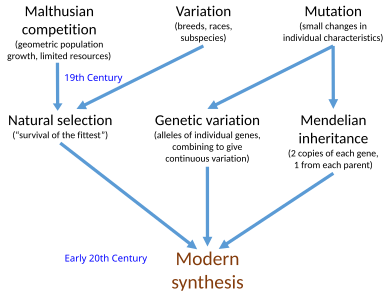User:M.I.S./sandbox

Neo-Darwinism is generally used to describe any integration of Darwin's theory of evolution by natural selection with Gregor Mendel's theory of genetics. Mostly used to refer to evolutionary theory from either 1895 (for the combinations of Darwin's and Weismann's theories evolution) or 1942 Modern synthesis (20th century). Though it can refer to any new Darwinian/Mendel-based theory such as the current evolutionary theory. The term Neo-Darwinism marks the combination of natural selection and genetics, and as it has variously been modified since it was first proposed.
Early usage[edit]

Darwin's theory of evolution by natural selection as publish in 1859, provided a selection mechanism for evolution, but not a trait transfer mechanism. Lamarckism was still a very popular candidate for this. As part of the disagreement about the mechanisms of evolution, Samuel Butler called the British naturalist Alfred Russel Wallace strongly opposition to Lamarckism, for Neo-Darwinism [1][2]. Weismann and Wallace rejected the Lamarckian idea of inheritance of acquired characteristics that even Darwin took for granted [3][4]. The basis for the complete rejection of Lamarckism was Weismann's germ plasm theory. Weismann realised that the cells that produce the germ plasm, or gametes (such as sperm and eggs in animals), separate from the somatic cells that go on to make other body tissues at an early stage in development. Since he could see no obvious means of communication between the two, he asserted that the inheritance of acquired characteristics was therefore impossible; a conclusion now known as the Weismann barrier [5].
It is however usually George Romanes, that is credited for the first use of the word in a scientific context. Romanes used the term to describe the combination of natural selection and the August Weismann's germ plasm theory,that evolution occurs solely through natural selection, and not by the inheritance of acquired characteristics resulting from use or disuse, making the word to mean, 'Darwinism without Lamarckism' [6][2][7]
Following the development, from about 1918 to 1947, of the modern synthesis of evolutionary biology, the term neo-Darwinian stated to be to refer to that contemporary evolutionary theory [8][9].
Any current version of evolutionary thinking[edit]
Biologists however have not limited their application of the term neo-Darwinism to the historical modern synthesis. For example, Ernst Mayr wrote in 1984 that "the term neo-Darwinism for the synthetic theory [the modern synthesis of the early 20th century] is wrong, because the term neo-Darwinism was coined by Romanes in 1895 as a designation of Weismann's theory" [10] [11][7][12].
Publications such as Encyclopædia Britannica similarly use neo-Darwinism to refer to current evolutionary theory, not the version current during the early 20th century synthesis [13]. Richard Dawkins and Stephen Jay Gould have used the term in their writings and lectures to denote the forms of evolutionary biology that were contemporary when they were writing [14][15].
See also[edit]
References[edit]
- ^ Butler, Samuel (1880). Unconscious Memory. David Bogue. p. 280.
I may predict with some certainty that before long we shall find the original Darwinism of Dr. Erasmus Darwin … generally accepted instead of the neo-Darwinism of to-day, and that the variations whose accumulation results in species will be recognised as due to the wants and endeavours of the living forms in which they appear, instead of being ascribed to chance, or, in other words, to unknown causes, as by Mr. Charles Darwin's system
- ^ a b Beccaloni, George (2013). "On the Terms "Darwinism" and "Neo-Darwinism"". A. R. Wallace Website.
- ^ Darwin 1872, p. 108
- ^ Kutschera, Ulrich (December 2003). "A comparative analysis of the Darwin-Wallace papers and the development of the concept of natural selection". Theory in Biosciences. 122 (4): 343–359. doi:10.1007/s12064-003-0063-6. ISSN 1431-7613. S2CID 24297627.
- ^ Barbieri, Francisco D. (1989). "The origin of Metazoa and Weismann's germ line theory". Rivista di Biologia. 82 (1): 61–74. ISSN 0035-6050. PMID 2665023.
- ^ Gould 2002, p. 216
- ^ a b Reif, Wolf-Ernst [in German]; Junker, Thomas [in German]; Hoßfeld, Uwe [in German] (March 2000). "The synthetic theory of evolution: general problems and the German contribution to the synthesis" (PDF). Theory in Biosciences. 119 (1): 41–91. CiteSeerX 10.1.1.329.7230. doi:10.1007/s12064-000-0004-6. ISSN 1431-7613. S2CID 4893208.
- ^ Moran, Laurance (January 22, 1993). "The Modern Synthesis of Genetics and Evolution". TalkOrigins Archive. Houston, TX: The TalkOrigins Foundation, Inc. Retrieved 2007-09-19.
- ^ Bock, Walter J. (July 1981). "Reviewed Work: The Evolutionary Synthesis. Perspectives on the Unification of Biology". The Auk. 98 (3): 644–646. ISSN 0004-8038. JSTOR 4086148.
- ^ Mayr, Ernst (1984). "What is Darwinism Today?". PSA: Proceedings of the Biennial Meeting of the Philosophy of Science Association. 1984 (2): 145–156. doi:10.1086/psaprocbienmeetp.1984.2.192502. ISSN 0270-8647. JSTOR 192502. S2CID 147090072. Volume Two: Symposia and Invited Papers (1984).
- ^ Kutschera, Ulrich; Niklas, Karl J. (June 2004). "The modern theory of biological evolution: an expanded synthesis". Naturwissenschaften. 91 (6): 255–276. Bibcode:2004NW.....91..255K. doi:10.1007/s00114-004-0515-y. PMID 15241603. S2CID 10731711.
- ^ Pigliucci, Massimo (December 2007). "Do We Need An Extended Evolutionary Synthesis?" (PDF). Evolution. 61 (12): 2743–2749. doi:10.1111/j.1558-5646.2007.00246.x. PMID 17924956. S2CID 2703146.
- ^ "neo-Darwinism". Encyclopædia Britannica. Chicago, IL: Encyclopædia Britannica, Inc. 2015. Retrieved 2015-11-19.
- ^ "Neo-Darwinism Lecture by Richard Dawkins" on YouTube. The video of the lecture was originally posted on May 5, 2010, at old.richarddawkins.net: "Lecture on Neo-Darwinism". Archived from the original on December 1, 2014. Retrieved 2013-07-07..
- ^ Gould 2011, pp. 53–73
Bibliography[edit]
- Darwin, Charles (1872). The Origin of Species by Means of Natural Selection, or the Preservation of Favoured Races in the Struggle for Life (6th ed.). London: John Murray. OCLC 1185571.
- Gould, Stephen Jay (2002). The Structure of Evolutionary Theory. Cambridge, Massachusetts: Belknap Press of Harvard University Press. ISBN 978-0-674-00613-3. LCCN 2001043556. OCLC 47869352.
- Gould, Stephen Jay (2011). "Challenges to Neo-Darwinism and Their Meaning for a Revised View of Human Consciousness". In McMurrin, Sterling M. (ed.). The Tanner Lectures on Human Values. Vol. 6. Salt Lake City, UT; Cambridge, UK: University of Utah Press; Cambridge University Press. ISBN 978-0-521-17647-7. OCLC 846869183. "Lecture delivered at Clare Hall, Cambridge University April 30 and May 1, 1984"

